|
|
|
Sort Order |
|
|
|
Items / Page
|
|
|
|
|
|
|
| Srl | Item |
| 1 |
ID:
095373


|
|
|
|
|
| Publication |
2010.
|
| Summary/Abstract |
Bilateral investment treaties (BITs) have become the dominant source of rules on foreign direct investment (FDI), yet these treaties vary significantly in at least one important respect: whether they allow investment disputes to be settled through the International Centre for the Settlement of Investment Disputes (ICSID). Through the compilation and careful coding of the text of nearly 1,500 treaties, we identify systematic variation in "legal delegation" to ICSID across BITs and explain this important variation by drawing upon a bargaining framework. Home governments prefer and typically obtain ICSID clauses in their BITs, particularly when internal forces push strongly for such provisions and when they have significantly greater bargaining power than the other signatory. Yet some home governments are less likely to insist upon ICSID clauses if they have historical or military ties with the other government. On the other hand, although host governments are often hostile toward ICSID clauses, particularly when sovereignty costs are high, they are more likely to consent to such clauses when they are heavily constrained by their dependence on the global economy. Our findings have significant implications for those interested in FDI, legalization, international institutions, and interstate bargaining.
|
|
|
|
|
|
|
|
|
|
|
|
|
|
|
|
| 2 |
ID:
113751
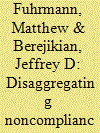

|
|
|
|
|
| Publication |
2012.
|
| Summary/Abstract |
Why do states make disingenuous treaty commitments? Under what conditions will countries refrain from entering cooperative agreements with which they do not expect to comply? This article addresses these questions by analyzing how states that are pursuing nuclear weapons treat the nuclear Nonproliferation Treaty (NPT). The authors develop a distinction between two types of noncooperative behavior. The first is cheating while part of the NPT (predation) and the second is pursuing nuclear weapons outside of the treaty (abstention). The authors' argument is that democratic proliferators are more likely to abstain because executives in democracies are domestically constrained to a greater degree than authoritarian leaders. Statistical tests in a sample of all countries with active nuclear weapons programs from 1968 to 2004 provide evidence in favor of our argument. Controlling for confounding variables and the factors that motivate states to pursue nuclear weapons, the results show that states with greater constraints on executive authority are less likely to choose predation. Yet, electoral mandates do not appear to dissuade governments from making disingenuous treaty commitments. These findings have important implications for nuclear proliferation, the credibility of international commitments, and efforts to link domestic political institutions with international outcomes.
|
|
|
|
|
|
|
|
|
|
|
|
|
|
|
|
| 3 |
ID:
090369
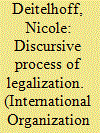

|
|
|
|
|
| Publication |
2009.
|
| Summary/Abstract |
For many political observers the successful creation of the International Criminal Court (ICC) came as a surprise, as major powers, in particular the United States, had opposed the plans for the ICC. Moreover, the institutional design of the ICC entails enormous sovereignty costs for states but only uncertain benefits. An analysis of the negotiations suggests that the court's successful creation can be attributed to persuasion and discourse within negotiations, that is, a shift in states' interests. The article develops a theoretical model of institutional change that defines the conditions under which persuasion and discourse can affect collective decision making. In particular, this study attempts to show that if (traditionally) weaker actors alter normative and institutional settings of negotiations they can further the chance of persuasion and discourse.
|
|
|
|
|
|
|
|
|
|
|
|
|
|
|
|
| 4 |
ID:
127060
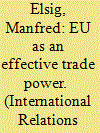

|
|
|
|
|
| Publication |
2013.
|
| Summary/Abstract |
Drawing on the European Union (EU) foreign policy literature on effectiveness, this article studies how the European Union chooses judges to serve on the World Trade Organization's key judicial institution: the Appellate Body. Conceptually, the article differentiates between effectiveness in representation and effectiveness in impact. The article shows how delegation to the European Commission has increased the strategic agenda-setting power for championing its preferred candidates. The article further compares European and US practice in nominating candidates. Overall, the article finds that effectiveness in representation has increased over time. In terms of effectiveness in impact, the article shows how the international environment conditions the EU's influence. The article also exposes the difficulties of studying the effectiveness of EU external relations due to the peculiar decision-making processes dominant in judicial bodies.
|
|
|
|
|
|
|
|
|
|
|
|
|
|
|
|
| 5 |
ID:
155773


|
|
|
|
|
| Summary/Abstract |
This article presents and examines a model of legalization on an original dataset of informal Canadian–US defence and security arrangements (DSA) formed between 1955 and 2005. Non-treaty arrangements permit US presidents to bypass Senate ratification, resulting in expediency and secrecy, both assets in defence and security relations. That withstanding, informal arrangements contain provisions responding to certain strategic problems. They detail aspects of legalization: delegation; obligations; and precision. Leaders select informal arrangements to incur fewer public commitments, but design them to ensure credibility. In that context, what factors shape informal DSA legalization? Propositions developed from delegation and rational institutionalist arguments identify the factors influencing informal DSA legalization. The Canada–US case is germane due to its “rules-based” nature and heterogeneity. An original dataset of the legal design of eighty-two bilateral DSA is introduced and analyzed. Results confirm cabinet shuffles and unified governments decrease DSA legalization while Democrat presidents and rising military threats increase it.
|
|
|
|
|
|
|
|
|
|
|
|
|
|
|
|
| 6 |
ID:
160515
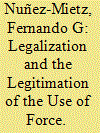

|
|
|
|
|
| Summary/Abstract |
Recent works on the role of argumentation in international politics have enriched our understanding of the discursive construction of international legitimacy. Many scholars have recognized the pervasiveness and privileged status of legal claims. Building on these insights, I advance the proposition that the international legitimacy of the use of force has legalized. Legalization implies that successful (de-)legitimation depends on the strategic use of international law, and that alternative legitimacy discourses (such as morality) have been marginalized and play a negligible role in the construction of legitimacy. Thus, the use of force is legitimate to the extent that it conforms to international law. I test this “legalization thesis” against the “hard” case of NATO's intervention in Kosovo in 1999. By revisiting the arguments used by state representatives, I show that, as expected in a legalized legitimacy system and contrary to what has become common knowledge about this case, legitimacy was gained through, not despite, international law. I analyze NATO's strategy of legitimation in detail and reconstruct it as a set of seven strategic moves, all of them appealing exclusively to the international legal discourse.
|
|
|
|
|
|
|
|
|
|
|
|
|
|
|
|
| 7 |
ID:
126224
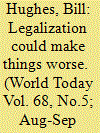

|
|
|
| 8 |
ID:
127355
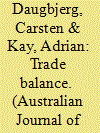

|
|
|
|
|
| Publication |
2014.
|
| Summary/Abstract |
The establishment of the World Trade Organization (WTO) has been widely accepted as representing the legalisation of world trading rules. However, it is important to reflect on the limits of this legalisation thesis in terms of the interface between international and domestic policy processes. By locating trading disputes in a political analysis of policy implementation, it is argued that it is difficult to establish conceptually how the WTO dispute settlement system could have authority separate from and above the conventional international politics of trade policy relations. Instead, the article argues that case outcomes should be expected to be largely the product of domestic political institutions and policy processes, and how these intersect with developments in the WTO dispute settlement system. Brief studies of the Australian government's dispute settlement strategy and two high-profile WTO disputes-the US upland cotton and European Union sugar cases-serve to suggest that the authority of international trade law is not as significant as assumed by the legalisation thesis. Rather, domestic politics and institutions have an important impact on the outcome of trade disputes.
|
|
|
|
|
|
|
|
|
|
|
|
|
|
|
|
| 9 |
ID:
164464
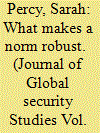

|
|
|
|
|
| Summary/Abstract |
The norm against female combat participation has been powerfully influential and extremely slow to change, despite a record of violation and concerted attempts by states to overturn it. As a result, it is a useful lens through which to examine the factors that make norms robust. I examine two junctures for where the norm has been tested but not overturned: World War II and the slow shift by some states to incorporate women into their militaries beginning in the 1980s. These instances reveal two important elements of norm robustness: (1) the degree to which norms are embedded with other norms is essential to understanding why the norm gained strength after women participated in World War II, and (2) the absence of legalization and norm entrepreneurs explains why the integration of women in the 1980s and onward has not overturned the norm. The article also examines other features of norm robustness, particularly the notion that norms that are both procedural and ethical in character will be more robust, and that the behaviour of powerful states does not always cause norm diffusion through the international system.
|
|
|
|
|
|
|
|
|
|
|
|
|
|
|
|
|
|
|
|
|